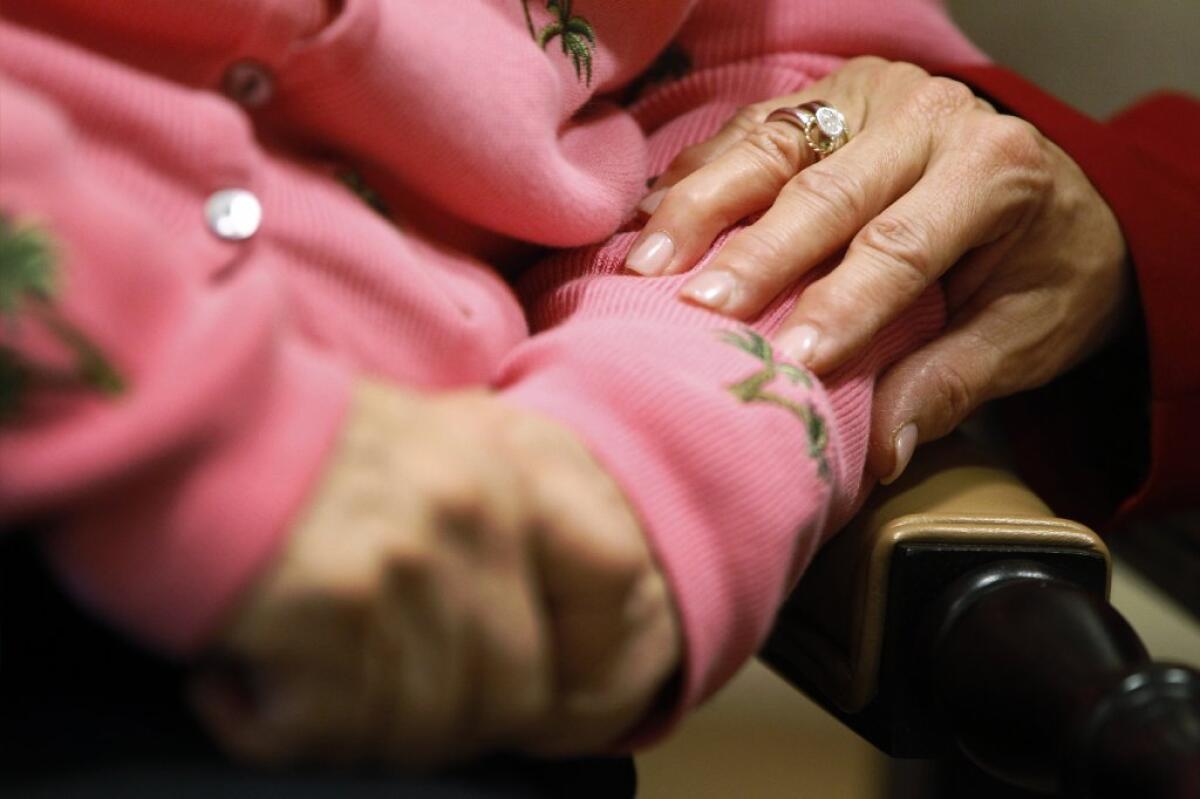Op-Ed: My friend has dementia and wants to end her life. California’s assisted-suicide law excludes her

Two months have elapsed since my dear friend and housemate received a dreaded diagnosis. She has an advanced stage of Alzheimer’s disease. Since then, our most frequent topic of conversation, which she always initiates, is about her desire to end her life.
My friend’s mind is still lucid enough to know what lies ahead, and it is not the final years she envisioned. She faces a long, slow journey into darkness.
And here’s what’s frustrating: If she had gotten a diagnosis of cancer or another terminal disease, she would have had a way of sparing herself and her loved ones from prolonged pain and misery. California’s physician-assisted suicide law allows people with terminal diagnoses to request prescriptions for life-ending drugs. But no state in the nation allows physician-assisted suicide for those suffering from dementia.
To be sure, extending death with dignity to those with dementia would require safeguards. A mentally compromised person could be subject to pressure from others, and it would be difficult to assess whether the decision was being made rationally.
But we need to find a way to both protect those suffering from dementia and also allow them to choose assisted suicide. The Alzheimer’s Assn. estimates that 690,000 Californians over the age of 65, currently have Alzheimer’s disease. That is surely enough to warrant attention from the legislature.
Dementia is an odd condition. It can lead to memory lapses and muddled thinking in some areas, while in other areas, there is clarity. At least that’s the way it is for my friend. Her mind is extremely lucid currently about her wishes for the future. She doesn’t want to live through losing her mind, and she wants the savings she and her late husband accumulated to go to her children rather than to the extremely high cost of caring for Alzheimer‘s patients.
But under California’s physician-assisted suicide law, a doctor has to certify that a patient has six months or less to live, and the patient has to be mentally competent and able to self-administer the drug. The problem with those conditions for Alzheimer’s patients is that by the time they are within six months of death, most no longer would be considered mentally competent and able to self-administer the drugs.
Since there is no cure for Alzheimer’s and it is irreversible, with the outcome 100% predetermined, here is how I think the law should be changed: Those in early stages of dementia, while they’re still capable of grasping their diagnosis and making rational decisions, should be permitted to sign an advance medical directive that orders assisted suicide either at a time specified in writing by the patient or at the point at which a specified level of mental deterioration has been reached. An independent evaluation at the time the directive is signed could be made by a doctor or other health professional to ensure the person fully understands what he or she is requesting.
Also, the requirement that a person need be within six months of death before qualifying for a prescription should be abandoned for dementia patients. And patients who have signed such advance directives should be allowed to designate someone else to physically administer the drugs if they are unable to do it themselves when the time comes.
My friend with Alzheimer’s is 87 and has lived a full life. She is still rational enough to know what awaits her, and she very much wants to avoid what she knows is coming in a matter of months or a few short years: a permanent move to warehoused care, where she will settle slowly into the unforgiving finality of the disease.
We have all read stories about caring spouses or friends who break the law to bring death with dignity to someone with dementia — and then are arrested for their compassion. That shouldn’t have to happen.
Ralph E. Shaffer is professor emeritus of history at Cal Poly Pomona. reshaffer@cpp.edu
More to Read
A cure for the common opinion
Get thought-provoking perspectives with our weekly newsletter.
You may occasionally receive promotional content from the Los Angeles Times.










